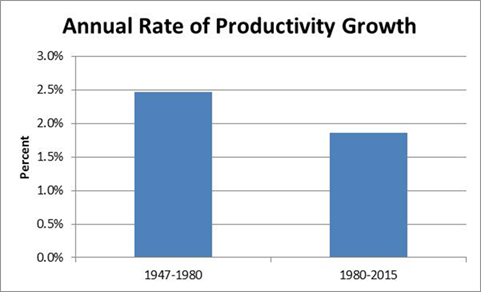March 22, 2016
No one reads the Washington Post opinion page to learn about the economy. People read it to learn what the Very Serious People have to say about the world. Michael Gerson gave us the latest edition in a column attacking Bernie Sanders and Donald Trump.
Readers learned that this was about the Very Serious People view of the world rather than economic reality in the second paragraph.
“The past several decades have seen both dramatic increases in productivity and the fading of the traditional, American, middle-class dream. The globalization of labor markets (creating competition with skilled workers abroad) and new technology and automation (hollowing out whole categories of labor at home) have placed downward pressure on wages and put a relentless emphasis on acquiring new skills.”
Both parts of this assertion are wrong. First, the past several decades have actually been a period of relatively slow increases in productivity growth, as our good friends at the Bureau of Labor Statistics will tell anyone who visits their website. (CEPR offers free tours for Washington Post columnists and editorial writers.) In the years since 1980, when inequality first began to grow, productivity growth has averaged 1.9 percent a year. That is down from 2.5 percent annual growth in the years from 1947 when wages at the middle and bottom grew as fast or faster than those at the top.

Source: Bureau of Labor Statistics.
Gerson doesn’t just get the basic story of productivity growth 180 degrees backward, he also gets the story of globalization wrong. Our manufacturing workers saw their pay lowered by globalization because that was the purpose of the trade agreements we negotiated. The point was to make it as easy as possible to relocate factories in Mexico, China, and other developing countries, putting our workers in direct competition with low-paid workers who were often willing to work for less than one-tenth the wages of our workers.
At the same time we left in place or even increased the barriers that protect doctors, dentists, and lawyers from having to compete with their lower paid counterparts in the developing world or even other rich countries. (Apparently our trade negotiators think that doctors and lawyers lack the skills necessary to compete in the world economy.) For example, doctors still have to complete a U.S. residency program to practice in the United States and dentists have go a U.S. dental school. (We recently starting allowing graduates of Canadian dental schools to practice here as well.)
In addition to the protectionist barriers that shield many of our most highly paid workers from international competition we also have worked to make patent protection and copyright protection stronger and longer. The lengths of both patent and copyright protection have been expanded substantially in the last four decades. We also allow patents in whole new areas such as software, lifeforms, and business methods.
And with all these policies designed to redistribute income upward we have also created a lot of jobs in the policy world, many paying six figures and some even seven figures, for economists and other professionals trying to figure out why we have inequality. (It’s always entertaining to hear economists worry that we are transferring income from workers to people who own the technology. Of course “owning” the technology was a government policy, not an economic outcome.)
Anyhow, after getting the diagnosis of the country’s economic problems completely wrong, Gerson goes on to deride Sanders:
“What is Sanders’s liberal populist answer to these challenges? He wants to increase Social Security benefits for everyone, including the wealthy; he wants free college education for everyone, without a serious emphasis on quality; he wants to break up the big banks; and he wants a single-payer health-care system.
“’What kind of guts does it show to promise people free things?’ asks Jonathan Cowan, president of Third Way, a moderate Democratic think tank.”
This is a great question for Mr. Cowan to pose, as the president of a think tank largely funded by rich people in the financial industry. Sanders has proposed paying for an expanded welfare state largely by taxing rich people. This naturally arouses the ire of people who are funded by rich people and by newspapers and columnists sympathetic to rich people.
He also has proposed running larger budget deficits. This is a necessary way to boost demand in an economy that has suffered from a serious shortfall in demand since the collapse of the housing bubble.
It actually takes a great deal of courage for a politician to propose increasing budget deficits, since they know that news outlets like the Washington Post will denounce them for it in both their opinion and news sections. They will take advantage of the fact that few people understand that the government is not constrained in its spending in the same way as a family is.
Furthermore, there is often no alternative source of demand in a weak economy, so that if the government did not run large deficits it would mean that we are simply wasting output and forcing people to be unemployed. And, as a generational matter, we are forcing our kids to grow up in households with unemployed parents.
Since few people understand these basic facts about government spending and the economy, a politician who advocates larger deficits can expect to be raked over the coals by their political opponents with the support of media outlets like the Post. (It also helps that almost no one has any understanding of the size of the government or the economy, so news and opinion pieces can scare people with really big numbers.) So it does in fact take a great deal of courage to propose a policy that will arouse so much wrath from the rich and powerful.







Comments